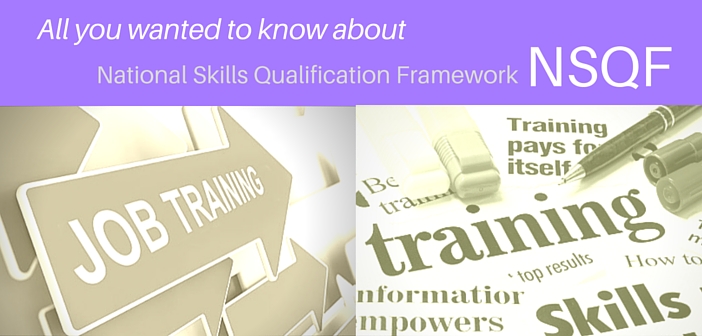National Skills Qualification Framework – NSQF is a competency-based quality assurance framework that aims at bridging the demand-supply gap for skilled workforce in different industry sectors in India. It strives to ensure various interoperable quality standards for progression and upward mobility through formal and informal education and training by mapping different levels of knowledge, skills and aptitude with requirements to successfully perform on the job. When implemented well, NSQF can go a long way in removing the stigma attached to vocational education and training by promoting a culture of credit transfers and other modes of recognizing and rewards accomplishments in vocational streams.
”All you wanted to know about…” is a knowledge series on skill development and employment brought to you by LabourNet Services India Pvt Ltd in partnership with National Skills Network (NSN).
 NSQF organizes qualifications according to levels of knowledge skills and aptitude in order to facilitate interaction between general education, vocational education and training that have hitherto been operating as separate and independent verticals
NSQF organizes qualifications according to levels of knowledge skills and aptitude in order to facilitate interaction between general education, vocational education and training that have hitherto been operating as separate and independent verticals
- The levels are detailed definitions of learning outcomes that the learner must possess and demonstrate irrespective of whether the learning takes place through formal schooling or non-formal.
- It primarily aims at establishing interoperability through a national level quality assurance framework that is on par with international standards
- As a competency framework it integrates vocational education and training, general education, technical education through various paths that show the higher order and levels of learning
- It aims at providing flexibility with multiple entry and exit levels
- One of the main objectives of NSQF is to facilitate easy entry into job market with desired skills and knowledge and continue learning and skill building for further qualifications
- Certification and credit, transfer of credits, scoring more marks – establish equivalence
- NSQF is derived in partnership with industry and prospective employers for validation of curriculum and upgrading with current knowledge and technologies.
The objectives of NSQF are:
- Accommodate the diversity of Indian education and training systems
- Develop and implement a set of qualifications for each level, based on outcomes that are accepted across the nation
- Develop and streamline multiple progression pathways that provide access to qualification and help people in moving easily between different education and training stream and between industry sectors.
- Progression paths also take into consideration their prior learning and experience through RPL assessments
- Function as a supporting mechanism for national regulatory and quality assurance measures for education and training
- Enhances international mobility of workforce through compliance with global standards
- NSQF comprises 10 levels each representing different levels of complexity, knowledge and autonomy required to demonstrate the competence commensurate to that level. Each level is defined by the extent of demands made of the learner in categories like professional knowledge and professional skills, core skills and responsibilities.
- For each job role and level the Qualification Packs (QPs) and National Occupational Standards (NOS) are formulated by the concerned industry through sector skill councils.
- NSQF is operationalized by National Skill Development Agency (NSDA) to ensure that the quality and standards meet the requirements of industry sectors through setting up of certifying bodies.
How NSQF helps schools and colleges
It is a well known fact that popular educational degrees in professional courses like engineering and management are not able to meet the talent requirements in the corporate sector in India. And, it also understandable that ITI and polytechnic courses are least aspirational even though they have an inherent potential to enable sustainable livelihoods , salaried jobs and self-employment. While most students are conditioned to one-track thinking they need to be aware of how their formal education connects with the workplace skills and the knowledge and abilities acquired through formal education. Some important questions need our immediate attention.
How do we create awareness among students and parents that engineering is not the only aspirational degree to fulfill career ambitions? Are they prepare to accept alternatives such as vocational streams of education and training? Why are ITI s and polytechnics seen as least priority options with no higher education and future prospects? Are our schools and colleges open to flexible ways of certification and academic progression? How do we connect education with employability and show various paths to upward mobility through recognition of prior learning (RPL) and formal certification.
Students need to know that formal degree curricula are mostly designed equip them with knowledge and they have to explore different ways of practicing and applying the knowledge. They need to appreciate the vocational aspects of learning alongside the school and college programs through real-work exposure, working with tools, machines and gadgets. Only then their higher education gets aligned with skills required at the basic levels and they are well prepared to understand the discipline and how it connect with the industry in a holistic manner. It is only by trying manual work that they develop respect for all trades and dignity of labour.
The journey from education to employment is marked with several milestones – on the two extreme ends we have the students, graduates or job aspirants and on the other end the industry, the corporates with a range of jobs in private and public sector. The process should enable meeting the market demands for skilled workforce through industry approved training curriculum and placement options. It also needs to take into consideration the training of trainers.














I am having 6 year experience in nursing as a senior staff nurse in fortis hospital mohali , qualification post basic bsc nursing .want job related to nursing profession.
i AM ELECTRICAL STUDENT